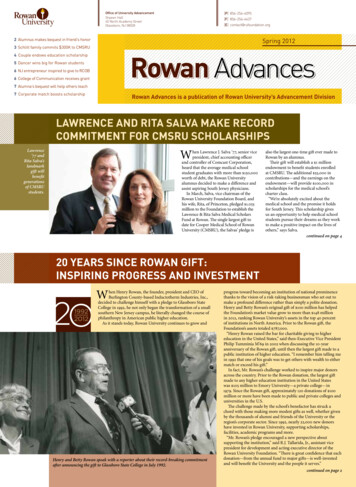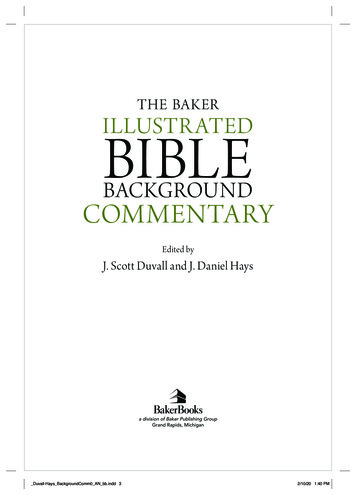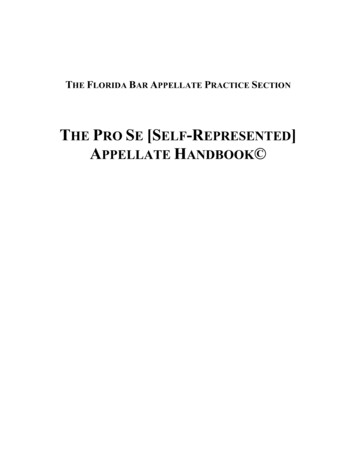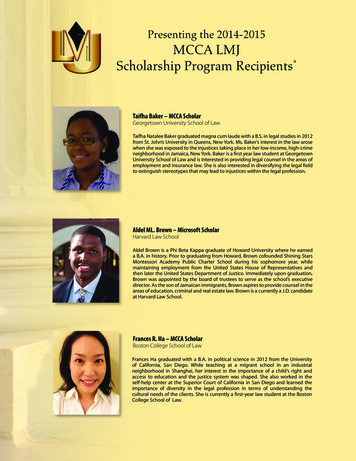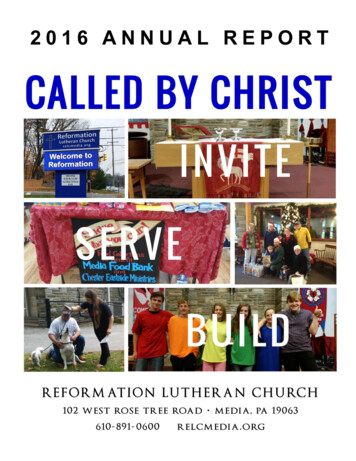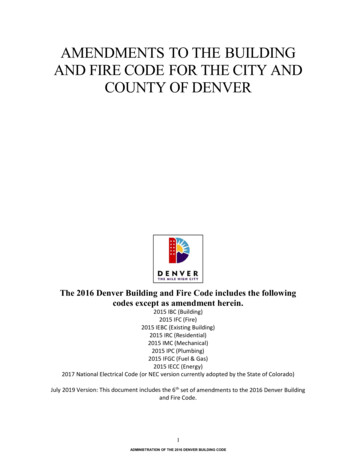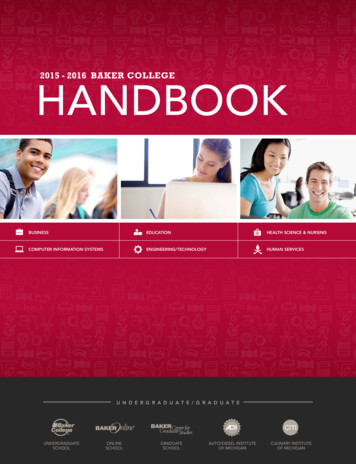
Transcription
HANDBOOK2015 - 2016 BAKER COLLEGEBUSINESSEDUCATIONHEALTH SCIENCE & NURSINGCOMPUTER INFORMATION SYSTEMSENGINEERING/TECHNOLOGYHUMAN SERVICESU N D E R G R A D U A T E / G R A D U A T /DIESEL INSTITUTEOF MICHIGANCULINARY INSTITUTEOF MICHIGAN
STUDENT HANDBOOKACADEMIC & FINANCIAL INFORMATIONNEW STUDENTSAdmissions.PG. 200NEW AND CURRENT STUDENTSFinancial Services.PG. 206CURRENT STUDENTSAcademic Information.PG. 216Academic Resources.PG. 220Student Services.PG. 222Academic Policies.PG. 226Student Records.PG. 237Disclosures.PG. 240Undergraduate Graduation.PG. 241199
NEW STUDENTSADMISSIONSWelcomeWelcome to Baker College. We are pleased that you have chosen Baker College to assist you in pursuing your academic and careergoals. We look forward to working with you toward successful completion of your program. The purpose of this handbook is to simplifyyour college journey and to provide vital information to assist you as a student.Mission StatementThe mission of Baker College is to provide quality higher education and training which enable graduates to be successful throughoutchallenging and rewarding careers.AdmissionsBaker College seeks to enroll students whose objectives can be served by its programs. Those whose qualifications show promise thattheir education and training here will be a mutually rewarding experience will be encouraged to enroll. Baker College follows a strictnondiscrimination policy in the admission of students.New Student RecordsUNDERGRADUATEEach student must have on file, as a part of his/her Baker College record: (1) a completed and signed application form; (2) self-certificationof high school graduation or GED test scores with acceptable ACT, SAT, or COMPASS scores, or COMPASS test scores that demonstrateability to benefit; (3) an official high school transcript and/or Educational Development Plan (EDP), if requested by the College; and (4) for atransfer student, an official transcript and/or a record of financial aid from his/her previous college or university, if requested by the College. Astudent must provide an official transcript to the College upon completion of two academic quarters, or future registration may be prohibited.GRADUATEEach student must have on file, as a permanent part of his/her Baker College record: (1) a completed and signed application form, and(2) an official transcript of credits from his/her baccalaureate institution showing the date of graduation. A transfer student must also providea transcript of grades and a record of financial aid from his/her previous institution.200
ABOUT THE PROCESS OF BECOMING A STUDENTUndergraduate Admissions Procedures/Requirements(See the graduate section for graduate program admission procedures.)Admission Policy StatementBaker College has a “Right-to-Try” admission policy, which means:1. All students who have earned a high school diploma or itsequivalent, such as a General Educational Development (GED)certificate, along with meeting the minimum entrance requirementscores on the ACT, SAT, ASSET, or COMPASS tests areaccepted.2. Baker College admits students without regard to race, religion,sex, national origin, or disability.3. Baker College provides students with support systems to allowthem opportunity for access. Disability Services is one of manyprograms provided through the Academic Advising Departmentto support persons with disabilities. Students must provide theCollege with documentation in order to participate in DisabilityServices.4. Baker College does not require either the ACT or SAT as acondition of admission. However, if a student chooses to takeeither or both tests, we encourage him/her to request that the testresults be sent to the Baker College campus of his/her choice.5. Students whose native language is not English are stronglyencouraged to demonstrate competency in the English languageby submitting official documentation such as the Test of Englishas a Foreign Language (TOEFL) score.6. Baker College reserves the right to deny admission to anypotential student who may be disruptive to the educationalenvironment of the College.7. Any student found to have falsified information on an admissiondocument will be denied admission to the College or expelled ifalready in attendance.8. New students, beginning in the summer quarter, will be placedon the newest version of the STEP Plan for the next academicyear.PLEASE NOTE:1. Students who earned a High School Certificate of Completionmust pass the Ability to Benefit scoring levels to be accepted butcannot receive federal financial aid for coursework for theirdesired programs.2. Students who have not earned a high school diploma or GEDmay be admitted on the basis of test results but cannot receivefinancial aid for coursework for their desired programs.How to apply for Undergraduate Program Admission1. The prospective student must fill out the application ascompletely as possible. For an online application visitwww.baker.edu2. The prospective student must return the application along withthe 20 application fee to the Baker College campus the studentwishes to attend. If the prospective student is not accepted, the 20 application fee will be refunded. If the student is accepted,the fee is non-refundable.3. Whenever possible, a copy of the prospective student’s finalhigh school transcript, ACT or SAT scores, or GED shouldaccompany the application.4. The prospective student will be contacted by the AdmissionsOffice as soon as the application is received.Applications for Acceptance to Baker Collegeare Available:ONLINE AT BAKER.EDUBY MAILApplications are included with the current catalog. Completedapplications may be forwarded to the College, along with theapplication fee and a copy of the student’s high school transcript orGED. It is very important that students visit the College, even whenthey apply by mail.ON CAMPUSStudents are encouraged to make an appointment to talk with one of theCollege’s Admissions Advisors. Applications may then be completedand application fees paid. Students taking the Ability to Benefit testmust complete either the COMPASS or ASSET test with appropriatescores prior to submitting an application to the College. Due togovernment regulations, students admitted under the Ability to Benefitguidelines are not eligible for federal financial aid.THROUGH HIGH SCHOOL COUNSELING DEPARTMENTSBaker College works closely with high school counselors bysupplying them with catalogs and applications. The AdmissionsAdvisors at Baker College also make periodic visits to area highschools to furnish them with new information concerning BakerCollege programs. It is highly recommended that students takeadvantage of their high school counselors’ expertise and assistancein completing the forms for admission, financial aid, and scholarships.Special Health Sciences, Education, and Human ServicesProgram Admission RequirementsSpecial admission and advancement requirements for individualHealth Sciences, Education, and Human Services programs aredetailed on the Baker College website at www.baker.edu or fromAdmissions Advisors or Academic/Administrative Offices. A signedHealth Sciences, Education, or Human Services Waiver Form mustbe on file in order for a student to start classes.Conditional Acceptance into Bachelor Degrees Requiringan Associate Degree or 90 Quarter HoursUnder specific circumstances, students will be conditionally acceptedinto bachelor degree programs requiring an associate degree or 90quarter hours. Students who need 16 credits or fewer to meet theprogram’s admission requirement of 90 quarter hours will be allowedinto the program conditionally. Students who are conditionallyaccepted into a program because they have 16 or fewer credit hoursto complete toward the program’s admission requirement will beallowed 12 months to complete those requirements. After 12 months,students who do not complete the required hours for full acceptancewill be blocked from registration and will need to select anotherprogram. Students missing official transcripts will also be granted“Conditional Acceptance.” Students may remain on “ConditionalAcceptance” because of missing transcripts for a maximum of twoquarters of coursework. If after two quarters of coursework, officialtranscripts have not been received, the College will remove thosestudents from the programs until the official transcripts are received.Upon receipt of the official transcripts by the College, students mayre-enter the program in which they were originally admitted, butmay not be able to start classes immediately because of rotationschedules and prerequisite requirements.201
International Student Special RequirementsArticulation CreditInternational students (except commuting Canadians) must fulfillstudent visa requirements and make an advanced tuition deposit(see “Tuition Deposit-International Students” on our website underStudent Services, Financial Aid, then Tuition and Fees). Internationalstudents are required to take the TOEFL (Test of English as aForeign Language) examination. A minimum score of 500 paper/173computer/61 Internet on the TOEFL exam is required for admission.This requirement may be waived by the campus President ordesignee on a case-by-case basis. Canadian students commutingfrom Canada are required to complete only an I-20.Baker College offers an articulation program for student work inhigh school or adult education settings. Students who participatein the Baker College articulation program have an opportunity toreceive college credit for articulated courses while completing theirhigh school requirements. College credit for articulated courses islimited to twelve (12) quarter hours toward a certificate program,twenty-four (24) quarter hours toward an associate degree program,and forty-eight (48) quarter hours toward a bachelor degree program.Prospective students, who wish to apply for articulated creditfor coursework taken in high school, should contact high schoolcounselors for assistanceApplicants who would like to transfer credits from an institutionoutside of the US must have their transcripts/degrees evaluated byan organization affiliated with the National Association of CredentialEvaluation Services (NACES/www.naces.org). The results of theevaluation must be sent from the evaluation company directly to thecampus. Official evaluations must include U.S. degree equivalency(if a degree is being transferred), course grades, and overall gradepoint average (GPA).Baker College does not accept International Students in the AviationProgram. Muskegon is no longer accepting new students into theAviation Program.NON-TRADITIONAL AND TRANSFER CREDITBaker College offers many non-traditional credit options for studentswith varied academic and professional backgrounds. It is BakerCollege policy to award credit to those with the appropriateexperience. Types of non-traditional credit currently offered by theCollege are described on the following pages.Guidelines for Non-Traditional CreditASSOCIATE DEGREE AND UNDERGRADUATE CERTIFICATESA student may apply non-traditional credit to meet the requirementsfor an associate degree or undergraduate certificate. This includestransfer credit from accredited collegiate institutions, articulationcredit, CLEP examinations, experiential credit, national/stateapproved licenses, valid proof of specialized registration/certification,and waiver test credit. Thirty-six of the required credit hours in theprogram must be completed in actual class time with Baker Collegefor associate degree programs, and one-half of the required credithours in the program must be completed in actual class time withBaker College for undergraduate certificates. A minimum of 12 credithours must be completed in actual class time through Baker Collegecourses in the major discipline of study.BACHELOR DEGREEA student may apply non-traditional credit to meet the requirementsfor a bachelor degree. This includes transfer credit from accreditedcollegiate institutions, articulation credit, CLEP examinations,experiential credit, and waiver test credit. Forty-eight of the requiredcredit hours in the program must be completed in actual class timewith Baker College. A minimum of 12 credit hours must be completedin actual class time through Baker College courses in the majordiscipline of study at the 300 and 400 levels. Different requirementsmay exist for the accelerated programs.POSTBACCALAUREATE CERTIFICATEThe policy for non-traditional credit varies depending on the certificate.GRADUATE DEGREETransfer credit from accredited collegiate institutions is the only formof non-traditional credit that may be applied to meet the requirementsfor a graduate degree.More information on articulation credit, as well as a list of participatinghigh schools/educational institutions, is available through theAcademic/Administrative Office or the Baker College website atwww.baker.edu.Credit by Examination AP (Advanced Placement)CLEP (College-Level Examination Programs)DANTES (Defense Activity for Non-Traditional EducationSupport)/DSST (DANTES Subject Standardized Test)These national credit-by-examination programs offer students theopportunity to demonstrate their academic proficiency in variousgeneral education and specific subject areas. Such proficiency mayhave been developed by the student outside of a traditional classroomthrough such means as personal reading, adult education courses,job experiences, etc. The Academic/Administrative Office hasavailable a list of recognized tests and the minimum scores necessaryto be granted credit. Financial Aid is not available for ExperientialCredit.Experiential CreditExperiential credit is available for students who have proven skillsgained through employment, volunteer, and/or military experiencesthat directly correlate to skills taught through traditional Baker Collegecourses. Not all courses are eligible for experiential credit nor do allprograms accept experiential credit. Financial Aid is not available forExperiential Credit.Students submit a portfolio documenting work and life experiences.The portfolio is evaluated and, if the skills and documented learningmatch the required student learning outcomes of a given course,experiential credit will be granted for that course. If the portfolioevaluation determines that the documentation did not meet therequired student learning outcomes, the student may not repeat theportfolio process for that same course.Once a student begins a specific course, he/she is not eligible forexperiential credit for that course. A student also may not use theexperiential credit process after failing a particular course.Students may prepare the portfolio independently or enroll in atwo-credit hour class (COL 301A Life and Learning) to aid in preparingthe portfolio and to assist with meeting the College’s portfolioguidelines. The two credits earned for COL 301A do not count towardgeneral education requirements. COL 301A is designed to helpstudents determine the major course of study that will maximize theirwork experience and lead to the preparation of a portfolio which willdocument experiential learning. Students enrolled in COL 301A havean opportunity, in courses where waiver tests are available, to earnthat credit at no additional cost.For Experiential Learning Credit for Work Experience see CareerServices - Work Experience Programs.202
Licenses and CertificatesAbility to BenefitCredit is awarded for certain professional licenses and certificates.The Office of the Registrar on each campus maintains informationabout this form of non-traditional credit.Students who have not earned a high school diploma or GEDcertificate are admitted on the following basis:Waiver TestsWaiver test credit may be earned for skills already developed. Thiscredit is awarded based on an examination developed by BakerCollege in the subject area. Any former, current, or prospectivestudent may take any waiver test. Passing the test for a course doesnot automatically result in the student waiving all the prerequisites tothe course. All waiver tests must be taken by the student prior to thebeginning of the course. Once a student begins a course, he/she isnot eligible to take a waiver test. The waiver test for a course may betaken only once. Following is a list of courses with waiver tests andthe charge for the test, if applicable.COURSECAD 111CIS 106BCIS 107BENG 091ENG 101EGR 101GRC 131AINF 112INF 113INF 114AINF 121INF 131INF 141AITP 111ITP 112ITP 113ITP 131AMTH 101MTH 108MTH 109MTH 111MTH 112MTH 124MTH 140NET 101SPN 101SPN 102SPN 103SCI 246Computer Aided Drafting IIntroduction to Operating Systems ConceptsIntroduction to Hardware ConceptsEnglish ReviewComposition IEngineering GraphicsIntroduction to Graphic ImagingWord ProcessingElectronic SpreadsheetsIntroduction to Database ApplicationsIntroduction to WindowsInternet and the World Wide WebMicrosoft PowerPointAmerican Sign Language IAmerican Sign Language IIAmerican Sign Language IIIFingerspelling IMathematics for BusinessCollege Mathematics ICollege Mathematics IIIntroductory AlgebraIntermediate AlgebraTrigonometryPre-CalculusNetworking Essentials ISpanish ISpanish IISpanish IIIChemistry ICHARGE 50 0 0 0 0 50 50 0 0 0 0 0 0 50 50 50 50 0 0 0 0 0 0 0 0 0 0 0 50PLEASE NOTE: Students not possessing a high school diploma orGED certificate CANNOT receive financial aid, and therefore, can takecourses only if they are cash paying or have a third-party payer.1. Students must take the COMPASS test and score at approvedlevels.2. The COMPASS test measures reading, writing, and numericalskills.3. To be eligible for Ability to Benefit status, a student must achieveor exceed the minimum scores on each subset of the COMPASStest in a single testing experience. A student may retest one timeonly. To be eligible to retest, a student must have the approval ofthe advising staff. Approval is based on the assumption thata meaningful change has occurred in the student’s knowledgeand skills in the areas assessed. Baker College recommends thatpotential students who have not achieved the minimum scores onthe COMPASS test pursue the completion of their GED throughtheir local adult education programs.4. Students who are planning to enter or have entered BakerCollege previously using ATB criteria should contact FinancialServices to assess financial aid eligibility.Transfer CreditUNDERGRADUATEBaker College welcomes transfer students into many degree programsat either the associate or bachelor level. Students with an associatedegree will be given every consideration to transfer their full associatedegree (two years of credit) into one of Baker College’s SmartDegree programs. However, transfer students are responsible for theprerequisite knowledge necessary for subsequent courses. With ourmany bachelor and accelerated bachelor programs, students areable to enter a bachelor degree program with the same major as theirassociate degree or begin a different major and have transfer creditsapply to their programs. Transfer credit is a form of non-traditionalcredit. See Guidelines above for how much Non-Traditional Credita student can bring into the College. A transfer student couldreceive freshman, sophomore, junior, or senior status, although morethan one or two academic years may be necessary to complete allrequirements of the degree. Classes with a grade of C (2.0) or higherwill be eligible for transfer credit with the exception of specific programstandards. Refer to individual program requirements. Classes witha D- (0.7) grade will be considered if the D- grade falls in a coursesequence in which the last grade in the sequence was a grade of aC or better.Transfer students need to be aware that length of time since thecourse was taken may be a factor in transferability.The College will accept credit from most baccalaureate institutions,special purpose institutions, community/junior colleges, technical orvocational institutions, proprietary institutions, and the United StatesArmed Services. Credit will be accepted from most institutions havingeither regional or national accreditation.If the previously earned degree is an associate degree from aregionally accredited institution, the General Education CourseRequirements for Associate Degrees are considered satisfied,and these same General Education courses would be applied to abachelor degree program. If the previously earned degree is abachelor degree from a regionally accredited institution, the GeneralEducation Course Requirements for Associate Degrees or BachelorDegrees are considered satisfied. Specific program requirementsand/or program accreditation standards may impose limitations oradditional requirements.203
To transfer a course, the course must equate in content and credithours to a Baker College course. The basis for credit awarded includestraditional classroom instruction, credit by examination, independentstudy, and articulation agreement credit. Media courses will transferif they meet traditional requirements. Credit for armed forces trainingmust be equated to Baker College courses and documented by theAmerican Council on Education (ACE). Credit from business andindustry training is evaluated through waiver testing or throughdocumented workforce training through ACE. Transfer credit acceptedmust be at the college level.To obtain transfer credit, students must request that previous collegesattended forward official transcripts to the Baker College Office of theRegistrar. Official transcripts will be accepted only through the USPostal Service and electronically from approved institutions. Handdelivered transcripts in sealed envelopes WILL NOT be consideredofficial transcripts. In some circumstances, the student will beresponsible for producing documentation including, but not limited to,catalogs, course descriptions, and syllabi.Baker College adheres to the Michigan Association of CollegiateRegistrars and Admissions Officers (MACRAO) official transcriptpolicy. The MACRAO policy is one in which all Michigan collegesagree not to issue an official transcript directly to a student. Officialtranscripts must be sent directly to the intended institution eitherthrough the US Postal Service or approved electronic format.In addition to the Baker College transfer credit/residency policies above,the following transfer credit restrictions (1-4) apply to the Paralegal/Legal Studies program:1. Legal specialty coursework that is being transferred must havebeen completed at a nationally or regionally accreditedinstitution of higher learning and meet with the approval of theprogram coordinator/director or other appointee to ensure thatthe credit being awarded is appropriate to meet the criteria forlegal specialty coursework within the program.2. A minimum of 20 quarter hours of the paralegal (PAR) coursesmust be completed in the traditional format at the campus fromwhich the student plans to graduate.3. No transfer credit will be granted for PAR 113A: Legal Research,Writing, and Analysis III; PAR 291: Civil Litigation;or PAR 491: Evidence (Litigation II).4. No experiential credit or credit by examination is offered forlegal specialty coursework credit.GRADUATEBecause Baker College recognizes the expediency of understandableand universally accepted standards related to transfer of academiccredit, the following policies are established for transfer credit.Baker College will accept no more than 16 quarter hours (12 semesterhours) of transfer credit for graduate programs. Classes with a B(3.00) grade or higher will be eligible for transfer consideration.To transfer a course, the course must equate in content and credithours to a Baker College course. Transfer of college credit will not beconsidered if the credit was completed more than five years precedingmatriculation.204agree not to issue an official transcript directly to a student. Officialtranscripts will be accepted only through the US Postal Service andelectronically from approved institutions. Official transcripts must besent directly to the intended institution either through the US PostalService or approved electronic format.RESIDENCE HALLSResidence hall accommodations are offered on the Cadillac, Flint,Muskegon, Owosso, and Port Huron campuses. Baker Collegeprovides modern, convenient residence halls or apartments, with avariety of living options on each campus. The residence hall livingenvironment supports students’ academic efforts and helps in theadjustment to college life.Students interested in on-campus housing should become familiarwith the Residence Hall Licensing Agreement and Residence HallGuidelines. Residence hall students must maintain full-time academicstatus (12 credit hours or more) to remain eligible for Collegehousing. Note: Students whose homes are in Wexford, Missaukee,Genesee, Muskegon, Shiawassee, or St. Clair counties are eligibleto live in residence halls only with the College’s permission and onlyif space permits.A full-time hall coordinator and/or student resident assistants createand promote opportunities for students to develop interpersonalrelationships, leadership and decision making skills, and an awarenessof individual responsibilities and rights. At Baker College, theresidence halls are more than just places for sleeping and eating.Residence hall life supports the College’s academic process and isan integral part of the living-learning experience.All rooms in the residence halls are partially furnished. They provideaccess to kitchen appliances so students may buy and preparetheir own meals. Lobby areas offer television, recreational games,and conversation areas. Study rooms, food vending machines, andcoin-operated laundry facilities are also located in most residencehalls. Residence hall licensing agreements vary by campus; checkwith the Residence Life Staff on each campus for more specificinformation.STUDENT ACTIVITIESBaker College recognizes that student activities are an importantpart of college life. A variety of extracurricular activities for studentsof all ages is provided during each school year. Activities includeathletic, recreational, and entertainment opportunities for studentsto gain new friends, develop leadership skills, and make college lifemore meaningful. Each campus has program-related clubs andorganizations that permit students to expand experiences beyondthe classroom. Community-sponsored events are also promoted.The Residence Life Staff or Academic/Administrative Office on eachcampus will have information on available activities. Students areencouraged to use leisure time productively and to participate indiverse activities.VETERANS’ BENEFITSUnited States Armed Services Veterans’ benefits are available toeligible students upon admission. Such students must complete thenecessary paperwork in the Admissions or Academic Office.To obtain transfer credit, students should request that all previouscolleges attended forward official transcripts to the Baker CollegeCenter for Graduate Studies. Official transcripts will be acceptedonly through the US Postal Service and electronically from approvedinstitutions.Baker College is approved to train eligible veterans and theirdependents under Chapters 10, 30, 31, 32, 33, 34, 35, 36, 1606,1607, Veterans Retraining Assistance Program (VRAP), and certainother types of veteran benefits. If you are a veteran, and would likemore information on the Post 911 GI Bill and other veteran benefits,go to www.gibill.va.govBaker College adheres to the Michigan Association of CollegiateRegistrars and Admissions Officers (MACRAO) official transcriptpolicy. The MACRAO policy is one in which all Michigan collegesBaker College is also approved for the Reserve EducationalAssistance Program (REAP) as well as the Restored Entitlement
Program for Survivors (REPS). Prospective students should contactthe College Veteran Advisor as far in advance of starting school aspossible. The advisor will help initiate the paperwork so it may becompleted accurately. Veterans and dependents of veterans shouldalways apply for other financial aid by completing the Free Applicationfor Federal Student Aid (FAFSA). To complete your financial aidapplication, go to www.fafsa.gov. The U.S. Department of VeteransAffairs can pay directly to the student or to the Baker CollegeFinancial Services Office. This is determined by what chapter ofbenefits the student is receiving. The student pays the balance owedto the College from these payments.Students receiving veterans’ benefits must continuously be in goodacademic standing (see Academic Standing). Students failing toremain in good academic standing will be placed on probation.Students are allowed only two consecutive quarters of probation.Veteran students who are not removed from probationary statusafter two consecutive quarters will not be re-certified for veterans’benefits until they are removed from academic probation. The U.S.Department of Veterans Affairs will be informed if a student fails tobe removed from probation at the end of two consecutive quarters.The Veterans Administration determines enrollment status accordingto the time frame the classes me
2. Baker College admits students without regard to race, religion, sex, national origin, or disability. 3. Baker College provides students with support systems to allow them opportunity for access. Disability Services is one of many programs provided through the Academic Advising Department to support persons with disabilities.

